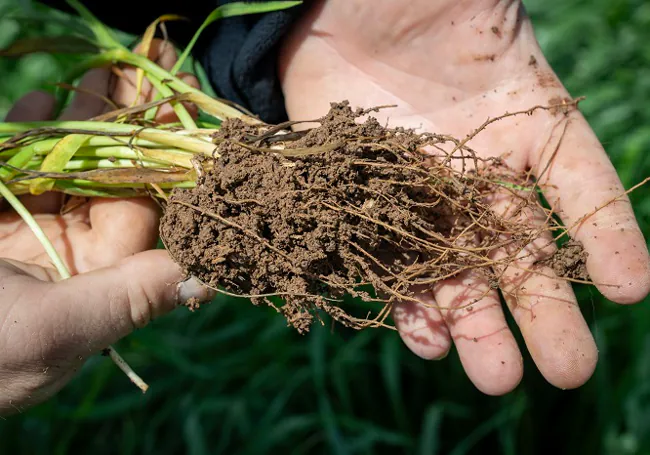Easter downpours help save cereal harvest in Malaga province
Last week's rainfall has brought relief to the countryside and removed the scenario of another season without harvesting due to the drought
The agricultural sector had been crying out for months for a storm like the one last week which dumped plentiful rain across Malaga province. It helped crops dying from drought, and the effects can already be seen in the cereal fields. Some 38,000 hectares are earmarked for this crop in Malaga province, and thanks to the Easter rains, a good harvest is now almost guaranteed.
It's a far cry from last year's situation when the drought crisis swept away large parts of the crop and caused economic turmoil for farmers. The areas in Malaga province where these crops are most concentrated are in Teba, Almargen, Ardales, Campillos, north of Antequera, the Serranía de Ronda and the Guadalhorce Valley. In 2022, thanks to the cultivation of cereal crops, farmers in Malaga province enjoyed a turnover of around 47 million euros. A year later, in 2023, the harvest was reduced to nothing.
The mood, which was at rock bottom at the time, has improved considerably. Farmers now have a positive outlook for a good harvest this year, and if April brings further rainfall, could even make it the best in history.
SUR was able to verify this in Campillos, one of the great providers of Malaga province. A week ago, where the sun now shines and the sky is a picture-postcard blue, dark clouds stretched across the horizon and the air felt particularly chilly. Rain was continuous and over a sustained period of time. The earth still retains moisture, which is noticeable in the smell that permeates the air and tractors are working in the fields.
Benito Avilés, a local farmer, said: "It rained as it had to rain for it to be beneficial for the fields. In abundance, but without violence". He is one of the many farmers who last year invested money and time for no rewards. "If we talk about the 2023 harvest, we are talking about throwing money into the field, literally," he said.
Four main types of cereals are grown in Malaga province: durum wheat, soft wheat, barley and oats. There are farmers like Avilés, who have a few hectares of land, and take advantage of it to plant some peas. But what is profitable and serves to improve the accounts are cereals. In Malaga province, most of it goes to the manufacture of animal feed. Some 10% goes to human food (soft wheat) and a small part goes to beer production.
Just a year ago, Avilés was walking on the same land he is walking on now. The crops, he recalled, barely reached his ankles. Now, they reach his knees. "The rains have been wonderful for the grain. It looks like nothing compared to last year," he said.
Survival
For a municipality like Campillos, which forms part of the agricultural belt of Malaga province, a lack of water is the main threat to its population. Farmers dedicated to single-crop agriculture are a minority. Almost all of them use their land to combine woody crops, especially olives, with cereals. "So as not to put all their eggs in one basket," Avilés said.
"Bad harvests are part of the countryside. If the cereal crop fails, you compensate with the olive grove and the other way round. What is not normal is for both to fail," he added.
However, Avilés said it's not time to celebrate. "We need it to keep raining and for the administrations to make progress on the water works they have promised." Avilés, just like many other farmers, said a long-term solution would be the so-called water highway, a project which aims to pump the regenerated water that is currently dumped into the sea through a 120-kilometre pipeline route.

If the economy of Campillos has such a heart, it beats in the town cooperative. That's where Rosa Hernández, agronomist and farmer, is based. She said she is a little less worried about the cereal harvest following the rains. "Let's hope it continues to rain more, but with what has fallen we can already say that we will be able to harvest. Last year, not even that," she added.
The distance separating Campillos from the municipality of Tebas is barely 15 kilometres. It is another of the province's grain providers. Mayor of Teba Cristóbal Corral told SUR the rains had been extremely beneficial. "After last year's disaster, the scenario this year for cereals is quite different. With last week's water, there will be a harvest. Now it needs to keep raining for it to be a good harvest," he added.

